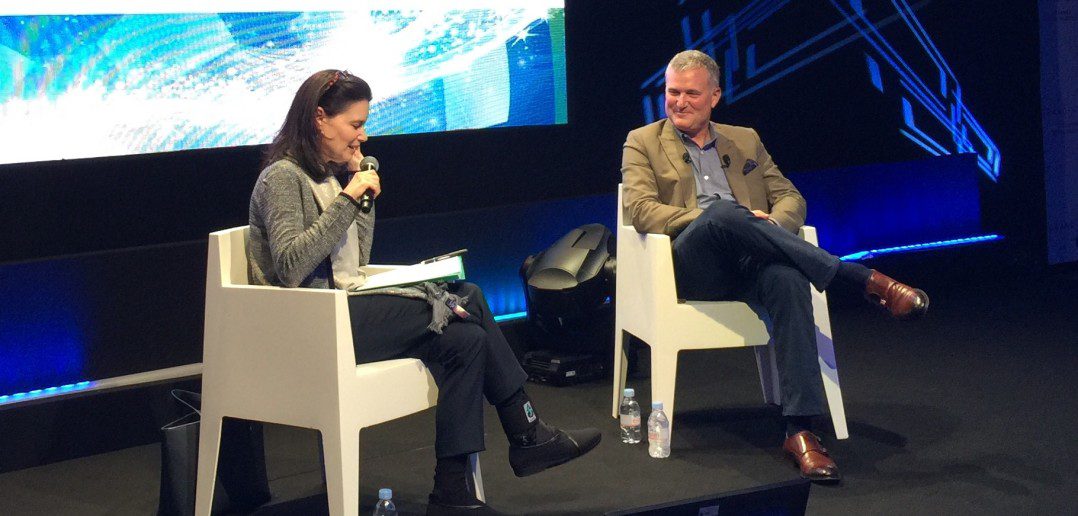You’ll know many of Hasbro’s iconic toy and game properties, from Monopoly and Transformers to Play-Doh and My Little Pony. But the company has been busily expanding its business and brands beyond those core market: to film, television, digital, music, licensing, theme parks and live events.
Chief content officer and executive vice president Stephen Davis is the man responsible for Hasbro’s entertainment and licensing businesses, including its Hasbro Studios division. For his keynote at MIPJunior today, he was interviewed by Anna Carugati, group editorial director of World Screen.
Hasbro Studios was set up in 2009. « Hasbro has so many great stories to tell. First of all Hasbro has the privilege of owning over 1,500 brands, and we really wanted to have a platform to be able to tell those stories, and frankly to have much more control of our destiny as a production and distribution company, » he said. Two years ago, Hasbro extended that strategy into its own film label – Allspark Pictures – to produce and finance its own films.
« I don’t think there’s a better time to be in the kids market than there is today. Even compared to 2009, the number of platforms that is available to expose your content has never been larger. And frankly the democratisation of content: kids are making their own content, » he said, before correcting the notion that Hasbro is a « toy company » – it sees itself as a « branded play company » now.
He talked about the challenges in getting children’s attention. « Kids are their own programmers now. They’re not waiting to be told what to watch because their choices are so wide. They can find content on so many different platforms. They want it when they want it, they don’t want to wait for it, » said Davis.
He added that shortform content is also changing the landscape considerably, and that it « really isn’t all that easy » to be producing content that runs across all these different platforms. « Kids are consuming 11 hours of media in about seven hours a day. That’s because they are on multiple platforms at any one time, » he said.
He continued: « Kids expect to connect more simply, and I think that kids because of the digital generation want to be more immersed in their connection with characters and with content, » he said. « A boy or girl can have a physical doll or action figure, but that figure can [also]live in a digital, content-driven world. »
Davis talked about how Hasbro plans for the future of some of its key franchises. « We decided we wanted to plot out the next 10 years of the Transformers franchise… we got together nine of the most creative writers I have ever worked with, » he said. « They plotted out the next 10 years of Transformers movies. And similarly we’re doing that with television and digital. »
He also talked about the company’s approach to innovation? « Hasbro has remained relevant because innovation is so important. You get a new generation every couple of years, so you have to remain relevant, » he said. « The digitalisation has – in a healthy way – really challenged our business… One of the best meetings that I go to once a month is an innovation meeting, where they just come in and expose us to all kinds of really cool new things. »
What’s next? Hasbro has also produced more than 120 episodes of the My Little Pony TV show, and has also worked on the Equestrian Girls spin-off that takes the ponies into a human world, with three movies already released, and a fourth in development. A second season of Transformers: Robots in Disguise is coming soon too.
Carugati wondered how Hasbro keeps a brand fresh over 120+ episodes. « We have the privilege of having brands that have such great resonance with consumers, » he said. « And because we have some of the brightest and best storytellers that we work in the business… we can sustain this enormous expression of our brands… But we’re also incredibly considered about who we work with. »
Davis praised Netflix for doing « an amazing job » of showing that « not all content needs to go on broadcast », but stressed that Hasbro thinks it’s important for its content to be available on broadcast networks as well as other platforms, to ensure it’s « everywhere that kids are ».
He moved on to the challenges and the opportunities: « They’re really one and the same. The international market from a nonlinear perspective has been somewhat behind the US and is now accelerating, » said Davis.
How does Hasbro see the threat and/or opportunities posed by the mobile games world, which is spawning brands like Minecraft and Candy Crush – the former of which doesn’t have a story, as such, while the latter doesn’t have characters or a story.
Davis pointed out that Hasbro is in the mobile gaming business through its Backflip Studios subsidiary, which develops games like DragonVale. « I see those as platforms to create a bigger story universe, » he said. « Minecraft is going to be turned into a movie and it will be a hugely successful movie. Mobile gaming has incubated that market… Not every mobile game needs a TV show or movie. Not every console game does. But those opportunities are there and we love to take advantage of that if we can. »
Davis came back to the question of attracting kids’ attention. « The generation of kids that we’re engaging with do have so many choices. And a relatively short attention span, which I think has probably become more acute as the result of the digitalisation of our business, » he said. « Being authentic is really important. Consumers have very little tolerance for 22-minute or 72+-minute commercials. »




